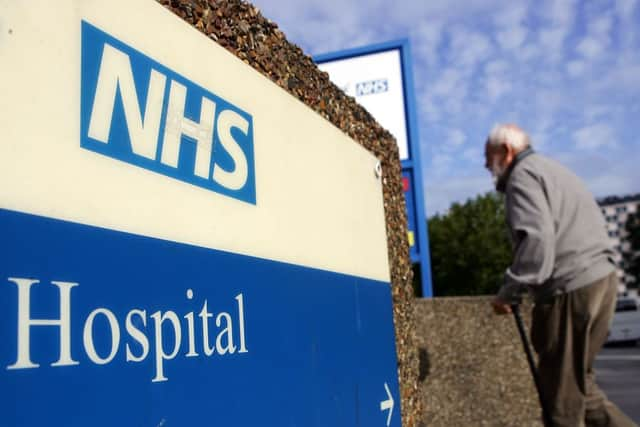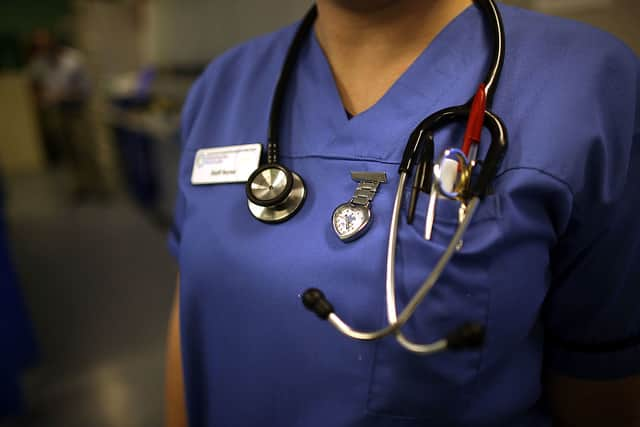Exclusive:British man gets hernia surgery in Lithuania because of lengthy NHS waiting lists
and live on Freeview channel 276
One afternoon in August 2019, Graham Browne was lifting something in his back garden in Exeter when he felt a sharp pain in his stomach. Immediately, he had a feeling it was a hernia - and said so to his wife - but waited a week or so to see if things got better, hoping he had simply strained a muscle.
When the pain continued, Graham, now 58, rang his GP. But the wait for an appointment was a month, which he admitted was “frustrating”. He told NationalWorld: “I wanted a diagnosis, so I looked into going private. But the costs were just ridiculous, so I had no choice but to wait.”
Advertisement
Hide AdAdvertisement
Hide AdWhen Graham’s appointment eventually came around, his GP told him to rest for six weeks and come back after that. “I told him I’d already been resting for five weeks,” Graham said. “And I knew what I had done, really. I just needed him to confirm it.”
But Graham was still sent away for six weeks, only to return after the period with the same pain and the same problem. From there, he was referred to physio - which meant more waiting time - and after that, referred to a consultant, by which point it had been six months since this all began.
However, things still weren’t going to plan, as the waiting time to see an NHS consultant was four months. “So I decided to go private,” Graham said. He paid nearly £400 for a scan, and the doctor confirmed he had an inguinal hernia and needed surgery. “He said he could do it for me any time, but the cost would be £12,000. I simply couldn’t afford that,” Graham told NationalWorld.


Graham asked if he could have the surgery done on the NHS, and the surgeon said he could - but that he would have to be referred back into the system, and therefore put at the bottom of the waiting list again.
Advertisement
Hide AdAdvertisement
Hide Ad“I understood that; it was quite right and proper that he did that, otherwise people would game the system,” Graham said. “But it was exasperating, because it meant I had to wait to be diagnosed with something that I had already been diagnosed with.”
And so the process began again. In the months spent waiting, though, Graham came across a place called the Nordbariatric Clinic in Lithuania, which allows patients from abroad to travel there to have treatment.
“I obviously had concerns about going abroad though,” he admitted. “My daughters told me all kinds of horror stories.” But when Graham was finally seen by the consultant, he was told the waiting list for surgery was a further eighteen months.
By this point, it had already been three years since he had first seen his GP, as the waiting list had steadily increased due to the coronavirus pandemic.


Advertisement
Hide AdAdvertisement
Hide Ad“I decided I couldn’t wait any longer,” Graham said. His life had been on pause - he couldn’t do the things he loves, like sailing or playing golf. So he got in touch with the Nordbariatric Clinic, and ended up flying out there for an appointment - both for his hernia, and for a hip problem he had been having.
“It was a great experience,” Graham said. “I was picked up by someone at the airport, who drove me to my hotel, then to the clinic the next day. Within five minutes of being there, I had an X-ray, and within ten minutes, I was seen by a consultant for my hip.”
The consultant told Graham that he didn’t need surgery for his hip, and advised him on what treatment he would need instead. Then, Graham had a longer wait to see the consultant for his hernia - and ended up spending the few hours simply “watching” what went on in the clinic.
“It comforted me,” he said. “The staff were friendly, and everything felt ordered and under control. I saw doctors reassuring patients on their way to operations, talking to families while they waited. It felt right.”
Advertisement
Hide AdAdvertisement
Hide AdWhen the consultant arrived, he confirmed that Graham needed surgery for his hernia, and said they could see him in three weeks’ time. “He, and the others at the clinic, also answered all of my concerns about getting treatment abroad, because it was still a scary thing,” Graham said.
Graham flew back to the UK and discussed it with his wife and two daughters. He decided to try being treated at home one more time, and contacted another private hospital which was quoting a lower price of £6,000.
But when he got to his appointment there, after a four to five hour drive, he was told that they didn’t perform the operation he needed for the type of hernia he had. “So, my mind was made up,” Graham said. “I was going to Lithuania.”
Things were smooth sailing from when he arrived. He spoke to the surgeon and the anaesthetist on the morning of his operation, and then a couple hours later, was in recovery and feeling “great”. Funnily enough, Graham even shared a room with a man from Scotland - who had had a similar experience to him.
Advertisement
Hide AdAdvertisement
Hide AdGraham is now fully recovered and back to normal, playing golf as much as he pleases. The operation in Lithuania cost him £1,500, and even with accommodation and flights, the cost was less than £2,000.
He admitted that he feels if he had stayed with the NHS, he would “still be waiting for treatment now.” He explained to NationalWorld: “It’s sad because I’m really not having a go at the NHS. I know wonderful people who work there, and in the past - I had a heart attack - and they were fantastic. But in the past few years things have gone downhill.”


“It’s not the doctors or the nurses’ fault at all. It’s the fault of consecutive governments over the past several years. We have more people, we have less medics, we have people using the service when they shouldn’t be. The system is not fit for purpose; it’s underfunded and overcrowded.
“For an emergency, the NHS will always be great. But for anything else, nowadays, I would hate to be totally reliant on the NHS.”
Advertisement
Hide AdAdvertisement
Hide AdThis viewpoint was only further reinforced recently for Graham, as one of his daughters has been in hospital with pneumonia. While there, she also started suffering from chronic vertigo - which she needed medication for.
“The whole thing was a mess,” Graham said. “I stayed by her side the entire time, and no one would come to see her all day. When I would ask someone for help, because she was dizzy, disorientated, or the pain was getting worse, they would tell me they ‘didn’t have time’.
“The thing is, my daughter isn’t a whinger. She never cries. But one night she was on the brink of tears because she desperately needed tablets that hadn’t been brought to her in the evening run. Eventually, I managed to get someone to bring her the medication, but what about the people in hospitals who don’t have someone to help them? What about the people alone, who are too ill to ask?”


A spokesperson for the Nordbariatric Clinic said they were receiving more and more inquiries from people in the UK in recent years, as they warned that “delaying surgeries for a year and a half or more can increase the risk of complications.”
Advertisement
Hide AdAdvertisement
Hide AdMeanwhile, a spokesperson for the Department of Health and Social Care told NationalWorld: “We have made significant progress in tackling the longest waits, and those waiting 18 months for treatment have fallen by 90% since the September 2021 peak despite the impact of industrial action.
“We have already opened 127 community diagnostic centres across the country to offer quicker, more convenient checks outside of hospitals for conditions such as cancer, heart, or lung disease – with over 5 million additional tests so far delivered.
“Our Elective Recovery Taskforce is going further to use the independent sector so patients can be treated more quickly, and offer them more control over where they receive their care.”
On its website, NHS England says it has introduced 10,000 virtual wards as part of its mission to reduce waiting lists and cut the backlog.
Comment Guidelines
National World encourages reader discussion on our stories. User feedback, insights and back-and-forth exchanges add a rich layer of context to reporting. Please review our Community Guidelines before commenting.
